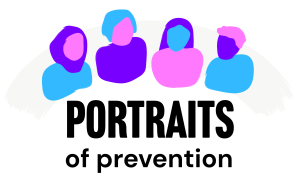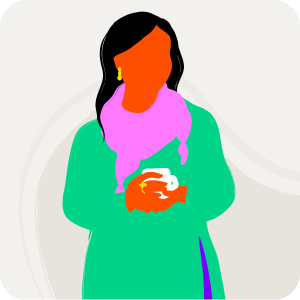
Soizic
Preventing violence against women with disabilities
Soizic is a Lead at a state-wide Disabled People’s Organisation (DPO) that advocates for the rights, safety and respect of women and gender diverse people with disabilities. This organisation, led by and for women and gender diverse people with disabilities, focuses on improving health services, preventing violence and promoting leadership.
Their family violence prevention work has a focus on building the capacity of the primary prevention, disability and social services workforces. This is achieved through a dedicated focus on both the prevention workforce and the disability and social services workforces, and also by bringing the two together in shared learning spaces to build a sense of mutual understanding. Her organisation is also part of the Women’s Health Services Network.
Key initiatives include the Gender and Disability Experts by Experience advocacy group, which provides consultations and facilitates the co-design and co-delivery of capability-building projects, resources and activities. This includes providing training to organisations and individuals and focusing on broader sector engagement. The Experts by Experience group is considered an essential part of the prevention workforce focused on lived experience and dismantling the intersecting drivers of violence.
Soizic’s professional background includes international development and social research, and she has a PhD in Political Science examining women’s political representation in Caribbean societies.
These experiences provided her with strong project management skills and an intersectional perspective on gender and disability. However, as a migrant woman with disabilities, she faced significant barriers to employment when she moved to Australia. She began her journey at the DPO as a project officer and, over time, progressed to her current leadership role, where she applies both her lived experience and professional expertise.
Soizic’s earlier work in international development and research equipped her with a strong foundation in project program design and an understanding of the structural dynamics of inequality. This knowledge has proven invaluable in her current role where she designs and implements programs that address overlapping systems of disadvantage and inequity.
Over time, she expanded her skill set to include budgeting, project management, staff management and stakeholder engagement. She also developed expertise in representing the organisation at external events, designing and delivering training, messaging and building strategic partnerships.
Soizic advocates for sustainable systems and processes to retain organisational knowledge, particularly given the challenges of high staff turnover caused by short-term funding. Succession planning and organisation-wide training play a crucial role in maintaining team cohesion and building capacity. Soizic encourages her staff to take advantage of a range of skills development opportunities including formal training, peer learning, mentoring and reflective practice. She values communities of practice and mentoring programs, in particular for developing complex skills such as monitoring and evaluation.
While the organisation currently does not work directly with men and boys, Soizic identifies this as a potential growth area. She also hopes to see greater investment in building the capacity of the disability sector to contribute to preventing violence against women and gender diverse people with disabilities.
An intersectional approach, according to Soizic, requires understanding the systems of oppression that overlap and interact, rather than just focusing on the experiences at the individual level. Curiosity, active listening, and a commitment to learning are also essential. Building genuine trust and partnerships, avoiding tokenism, and meaningful engagement with affected communities are key to achieving impactful outcomes.
Soizic’s approach to responding to disclosures includes setting clear boundaries at the outset of training to manage expectations and maintain safety. This includes tailored support for lived experience workers to support safe disclosure. She encourages all prevention workers to attend formal training to ensure consistent and safe practice across the workforce. She also notes that not all disclosures of sensitive content relate directly to gendered violence – disclosures of ableism and discrimination are also common and require a similarly sensitive response.
Soizic advocates for embedding intersectionality and continuous learning as fundamental principles.
Read more portraits of prevention
Daniel
Masculinities and working with men and boys
Daniel is a practitioner working in a practice leadership role in a program specialising in masculinities and working with men and boys.
Bel
LGBTIQ+ primary prevention – Rainbow Health Australia
Bel is a manager at Rainbow Health Australia and leads the LGBTIQ+ Family Violence Prevention Project.
Shweta
Early intervention
Shweta is a program manager leading a gendered violence prevention and early intervention program at a Women’s Health organisation, which is part of Victoria’s Women’s Health Services Network.



